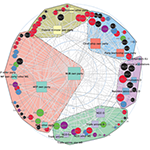Political actors cooperate with each other to share resources and to organize political support. In this article, we describe and explain such cooperative behavior in European Union policy-making by analyzing the information networks that parliamentarians of the Bundestag entertain with other party politicians and with interest groups. First, we describe whom parliamentarians cooperate with to receive policy information. Subsequently, we identify different types of cooperation networks.
Differences in the structure of these networks point to a political division of labor inside political parties which is driven by the need to organize political support in policy-making. Finally, we test the explanatory power of individual attributes, institutional positions and (shared) political interests to account for the structure of parliamentarians’ cooperation networks. While formal positions and party ideology generally shape parliamentarians’ cooperation, their relative importance varies across different types of networks. The article contributes theoretically to informational theories of interest group politics and to the literature on national legislators’ behavior in EU policy-making.
- Wonka, Arndt and Sebastian Haunss. 2020. ‘Cooperation in networks: Political parties and interest groups in EU policy-making in Germany’. European Union Politics 21(1): 130–151, https://doi.org/10.1177/1465116519873431.

